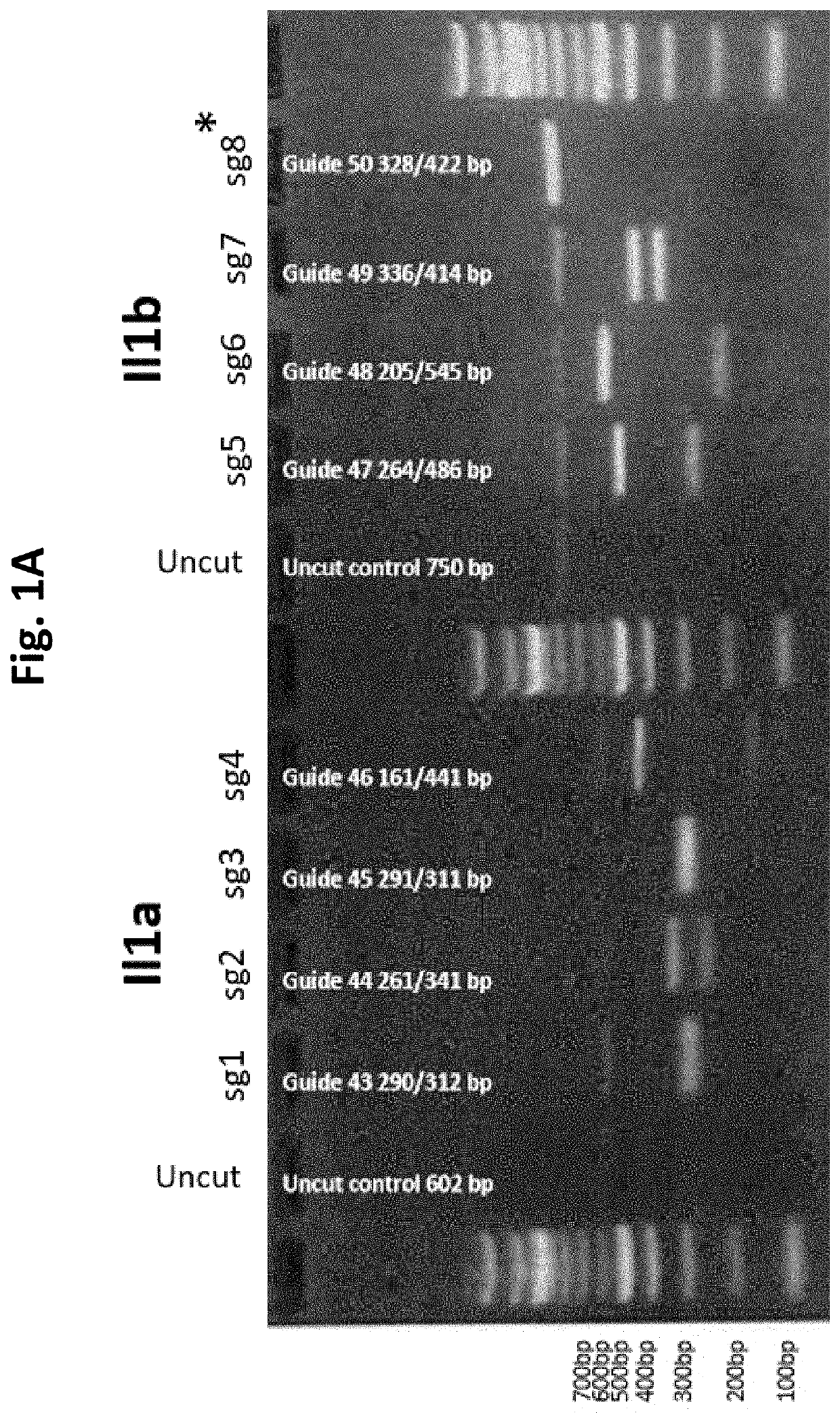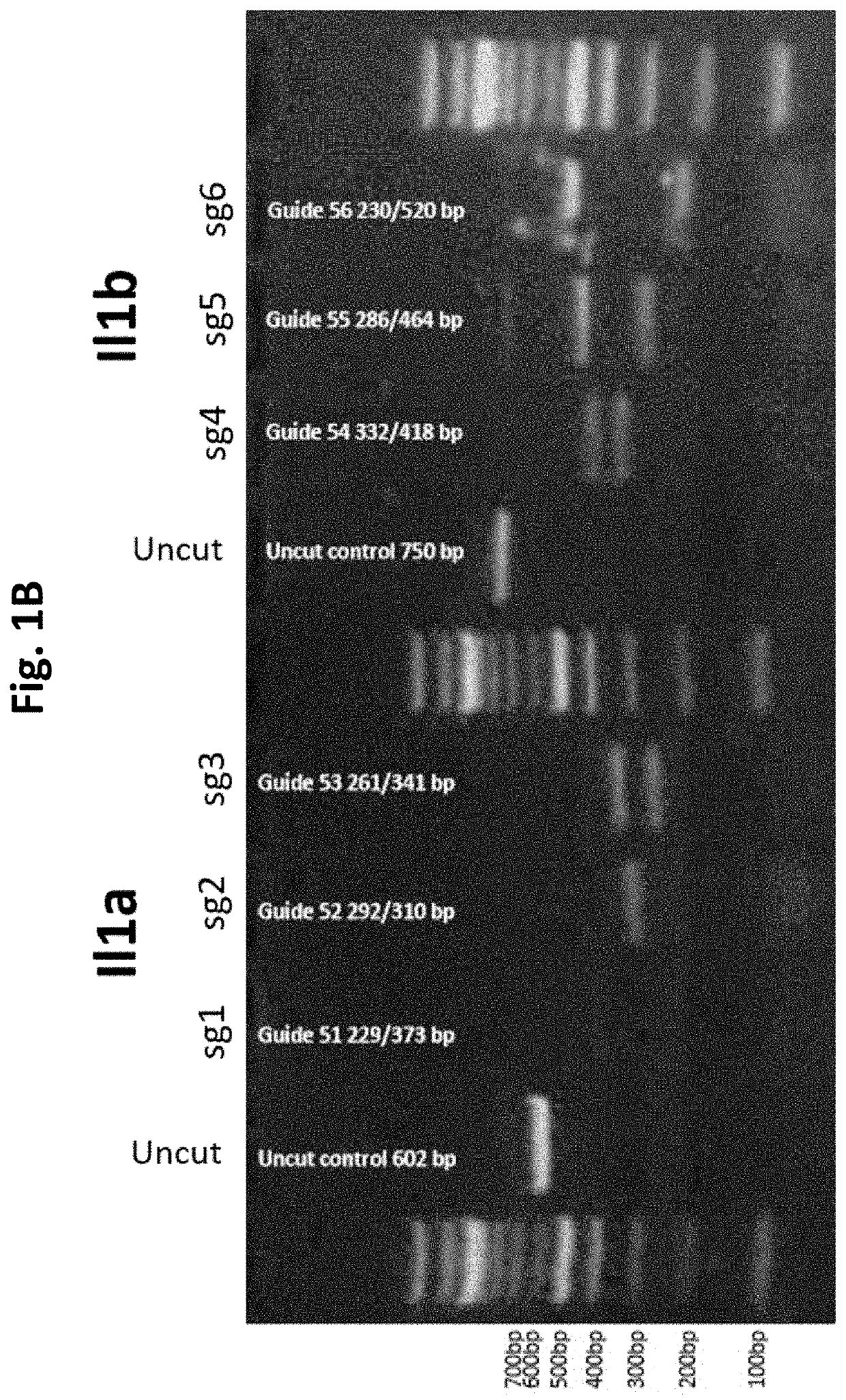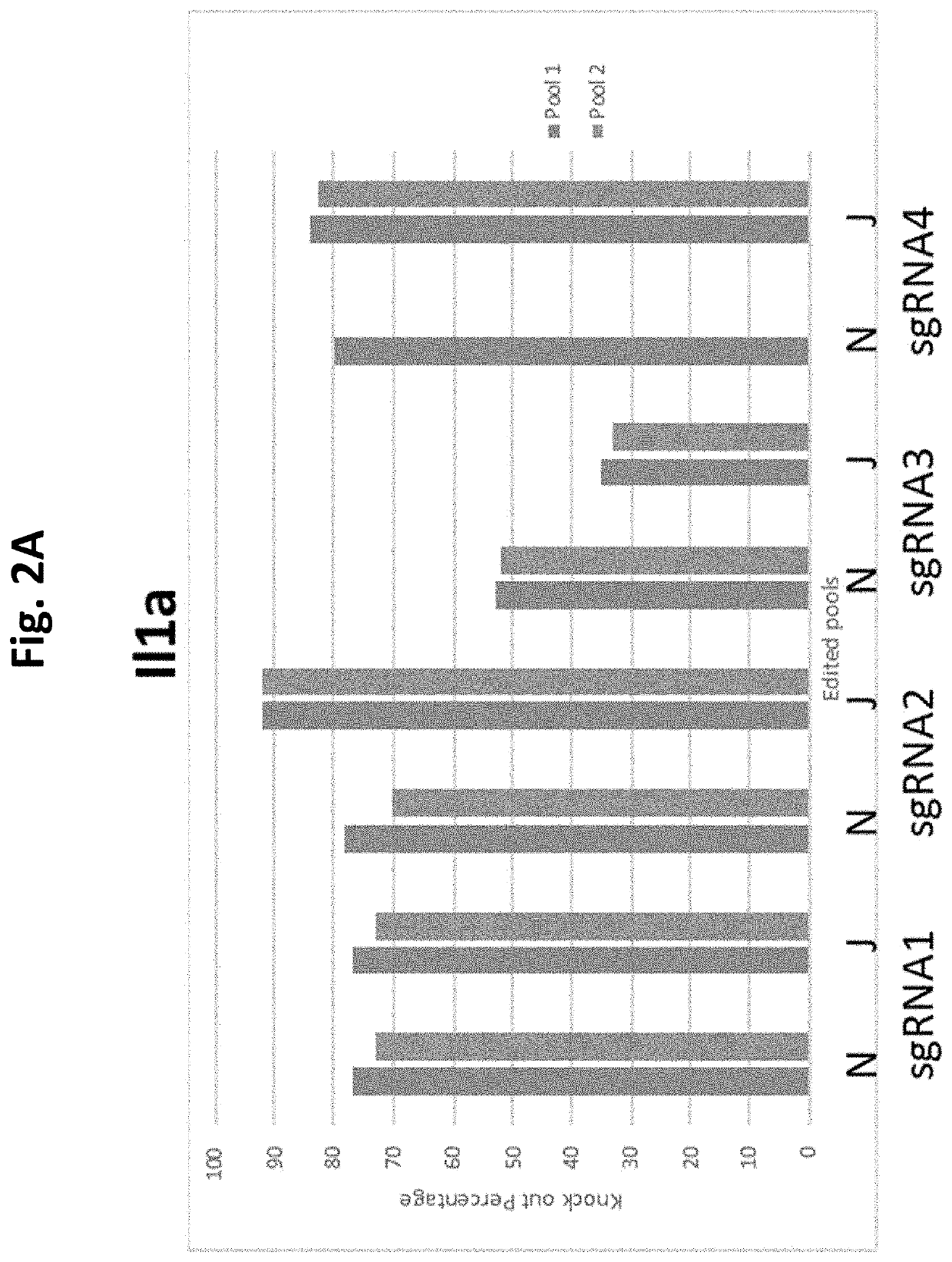Gene editing to improve joint function
a technology of gene editing and joint function, applied in the direction of genetic material ingredients, viruses/bacteriophages, drug compositions, etc., can solve the problems of complex treatment of osteoarthritis, degenerative joint disease, and other joint dysfunction, and few long-term options for symptomatic relief or restoring joint function, so as to reduce the expression of inflammatory cytokines and reduce the expression of il-1
- Summary
- Abstract
- Description
- Claims
- Application Information
AI Technical Summary
Benefits of technology
Problems solved by technology
Method used
Image
Examples
example 1
IL-1 Expression by CRISPR Gene-Engineering in a Mouse Model of Osteoarthritis
[0129]Sixty C57B mice are selected and distributed into four groups of fifteen mice each. The DMM surgical method is used to induce OA in each of the mice. Once the mice have developed OA, the mice are treated as follows:
[0130]Group 1: Direct injection into the OA joint a CRISPR AAV vector engineered to target IL-1α and IL-1β, and silence or reduce the expression of IL-1 protein.
[0131]Group 2: Direct injection into the OA joint a CRISPR AAV vector engineered with a “nonsense” payload that will not affect an IL-1 production; a negative control.
[0132]Group 3: Direct injection into the OA joint a CRISPR AAV vector engineered to target IL-1Ra, and silence or reduce the expression of IL-1Ra protein.
[0133]Group 4: Direct injection into the OA joint sterile buffered saline; a control for the injection process.
[0134]The mice are monitored before and after treatment to assess effects on their locomotion, and explora...
example 2
Guide Cutting Efficiency Against Mouse IL1A and IL1B
[0138]CRISPR guide RNA's (Phosphorothionate-modified sgRNA, Table 3) were designed against Exon 4 of Il1a and Exon 4 of Il1b(Il1a-201 ENSMUST00000028882.1 and Il1b-201 ENSMUST00000028881.13; see Table 2 for target sequences on Exon 4 of Il1a and Exon 4 of Il1b). C57BL / 6 mouse genomic DNA was used to amplify Exon 4 of Il1a and Il1b by PCR (Phusion High-Fidelity DNA polymerase, NEB cat #M0530S) Il1a primer fwd: CATTGGGAGGATGCTTAGGA, Il1a primer rev: GGCTGCTTTCTCTCCAACAG, Il1b primer fwd: AGGAAGCCTGTGTCTGGTTG, Il1b primer rev: TGGCATCGTGAGATAAGCTG. Amplicons were PCR purified (QiaQuick PCR purification kit cat #28106). Guide cutting efficiency was determined using an in vitro cleavage assay using 100 ng purified PCR product, 200 ng modified guide RNA (Sigma Aldrich) and 0.5 μg TrueCut Spy Cas9 protein V2 (Invitrogen A36498) or 0.5 μg Gene Snipper NLS Sau Cas9 (BioVision Cat #M1281-50-1). The two types of C...
example 3
IL-1β Expression by CRISPR Gene-Engineering in a Mouse Uric Acid Model
[0150]Time Course Experiment to Determine Optimal Pre-Treatment Time
[0151]A pilot experiment is performed to determine optimal pre-treatment time of mice with virus prior to challenging the mice with uric acid. Mice are injected with GFP-labeled AAV5 vector into the knee joint. Viral load is then quantified by PCR and location of viral infection is quantified by histology at 3, 5, and 7 days after infection. A treatment time that yields robust expression of virus inside the joint is selected as the optimal lead time for injecting viral vectors into the mice for the experiments to determine the reduction of IL-1b in a mouse uric acid model by a CRISPR AAV vector engineered to target IL-1b and silence or reduce expression of IL-1b.
[0152]Experiment to Confirm CRISPR AAV (AAV-spCas9) Knock Down of IL-1b Expression and Treatment Effect in Uric Acid Model
[0153]Mice are selected and distributed into three groups:
[0154]Gr...
PUM
| Property | Measurement | Unit |
|---|---|---|
| temperatures | aaaaa | aaaaa |
| time | aaaaa | aaaaa |
| time | aaaaa | aaaaa |
Abstract
Description
Claims
Application Information
 Login to View More
Login to View More - R&D
- Intellectual Property
- Life Sciences
- Materials
- Tech Scout
- Unparalleled Data Quality
- Higher Quality Content
- 60% Fewer Hallucinations
Browse by: Latest US Patents, China's latest patents, Technical Efficacy Thesaurus, Application Domain, Technology Topic, Popular Technical Reports.
© 2025 PatSnap. All rights reserved.Legal|Privacy policy|Modern Slavery Act Transparency Statement|Sitemap|About US| Contact US: help@patsnap.com



